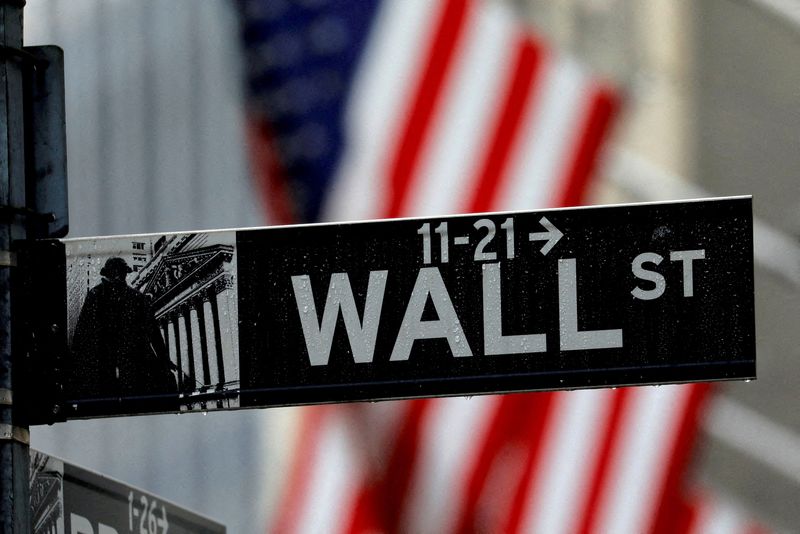 © Reuters. FILE PHOTO: Raindrops hang on a sign for Wall Street outside the New York Stock Exchange in Manhattan in New York City, New York, U.S., October 26, 2020. REUTERS/Mike Segar/File Photo
© Reuters. FILE PHOTO: Raindrops hang on a sign for Wall Street outside the New York Stock Exchange in Manhattan in New York City, New York, U.S., October 26, 2020. REUTERS/Mike Segar/File Photo
By Carolina Mandl
(Reuters) - Wall Street's main indexes ended Monday roughly down on fears that China could resume stricter measures to fight COVID-19 after it said it faces its most severe test of the pandemic.
Beijing said on Monday it would shut businesses and schools in hard-hit districts and tighten rules for entering the city, as infections ticked higher.
"There is this fear that China might reinstitute some of the COVID restrictions that they've just purportedly started to lift," said Carol Schleif, deputy chief investment officer at BMO Family Office.
U.S. casino operators with businesses in China including Wynn Resorts (NASDAQ:WYNN) Ltd, Las Vegas Sands (NYSE:LVS) Corp, MGM Resorts (NYSE:MGM) International and Melco Resorts & Entertainment (NASDAQ:MLCO) Ltd all fell at least 2%.
The Dow Jones Industrial Average fell 45.41 points, or 0.13%, to 33,700.28, the S&P 500 lost 15.4 points, or 0.39%, to 3,949.94 and the Nasdaq Composite dropped 121.55 points, or 1.09%, to 11,024.51.
Trading volume was low on Monday, and likely to lessen towards the Thanksgiving holiday on Thursday, leaving markets more prone to volatility.
Volume on U.S. exchanges was 9.43 billion shares, compared with the 11.88 billion average for the full session over the last 20 trading days.
"If you want to blame a little bit of profit taking on some concerns on spikes in COVID cases, that's fine," said Jack Janasiewicz, lead portfolio strategist and portfolio manager at Natixis Investment Managers Solutions. "It gets really tricky because of volume."
Stocks trimmed losses in early afternoon after the San Francisco Federal Reserve President Mary Daly commented that officials need to be careful to avoid a "painful downturn."
Cleveland Fed President Loretta Mester echoed Daly, saying she supports a smaller rate hike in December.
The S&P 500 energy sector index fell almost 3% on Monday to its lowest level in four weeks as oil prices tumbled more than 5% after a report that Saudi Arabia and other OPEC oil producers were discussing an output increase. The index, however, pared losses after Saudi Arabia denied talks about it.
Energy was the only major S&P 500 sector eying gains for the year, surging around 63%.
Walt Disney (NYSE:DIS) Co jumped 6.30% after Bob Iger's return as chief executive to the entertainment giant.
The S&P 500 extended its fall from the previous week when multiple Federal Reserve officials reiterated the central bank's pledge to raise rates until inflation was in check, as investors now await the release of minutes from the Fed's November meeting on Wednesday.
Traders are widely betting on a 50-basis point hike in the December meeting, with a peak for rates expected in June.
Among other stocks, Tesla (NASDAQ:TSLA) Inc plummeted 6.84% after the electric-car maker said it will recall vehicles in the United States over an issue that may cause tail lights to intermittently fail to illuminate.
Gay dating app Grindr tumbled 46.00% amid a broader market weakness, after skyrocketing in its debut on the New York Stock Exchange in the previous session.
Declining issues outnumbered advancing ones on the NYSE by a 1.27-to-1 ratio; on Nasdaq, a 1.60-to-1 ratio favored decliners.
The S&P 500 posted 9 new 52-week highs and 2 new lows; the Nasdaq Composite recorded 96 new highs and 220 new lows.

